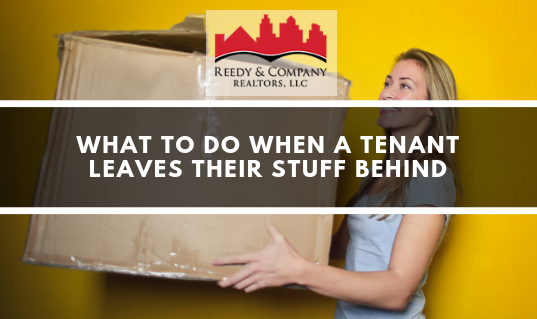Tenants leave things behind all the time, and dealing with those left-behind possessions is not always easy. Landlords are bound by law to handle abandoned possessions in a specific way based on the laws of the state. If your tenant has recently left a bunch of stuff behind or even just a few specific items, you’ll need to follow your state’s mandated procedure exactly in order to stay within the bounds of the law.
Fortunately, most states vary only in small details like time limits and very specific limitations. We can give you the gist of the process that is consistent from state to state so you know what lies ahead when tenants leave possessions behind.
Know Your State Laws
First, you need to read up on your state’s laws for tenant abandoned property. Each state defines the details of this process a little differently, primarily regarding:
- Method of Abandonment
- Whether the tenant left as-scheduled at the end of their lease, was terminated, was evicted, or disappeared without paying rent.
- Limitations on Possession Handling
- Some states, for example, would not allow you to store tenant property across state lines.
- Time Limits
- Many states set minimum time limits you are allowed to wait before sending a notice or for tenants to return for their items before they are disposed of.
Get a Neutral Witness
In case of liability accusations later, it’s always a good idea to have a neutral witness present when handling abandoned tenant possessions. Ask a neighbor or a friend with no financial stake to observe as you pack up tenant items for storage and processing.
Itemize, Photograph, and Store the Possessions
As you pack up tenant possessions, be sure to make an itemized record of what you’ve packed, where it was packed, where you’re storing it, and the related costs.
- Make a List
- Create an item-by-item list of everything you pack up
- Photograph Items
- Snap a photo of each item, or clearly laid-out groups of items, to show the condition and prove their presence at the time of packing.
- Store Safely Nearby
- Store tenant items safely nearby. This can be in paid storage, the unit’s garage or basement, or your own garage or back shed. As long as the items are nearby and secure.
- Keep Records of Related Costs
- If there are costs for packing or storage, keep records for itemized security deposit charges later.
Written Notice of Abandoned Property
Next, you will need to deliver a Notice of Abandoned Property, a letter you can find boilerplates for online. This letter needs to be hand-delivered or sent in a way that returns a receipt (Certified or First Class mail with receipt). It will also need to contain specific information:
- Hand-Delivered or Certified Mail
- Itemized List and Photographs
- Deadline (Check State Laws)
- Storage Location
- Cost of Storage
- What Will Happen to Unclaimed Property
Once the notice has been sent and received, you have until the indicated deadline to wait. After that time, you are free to sell, donate, or toss the tenant’s possessions as you so choose.
Exceptions
There are a few exceptions in how you must handle tenant possessions. For these three exceptions, you do not have to pack, store, and return items.
- Garbage is Trash
- Anything that is clearly garbage like packaging, broken furniture, and rotting food can simply be tossed.
- Fixtures are Part of the Unit
- Anything that was installed into the walls or ceiling like bookshelves, light fixtures, and coat hooks are legally now part of the unit. You can keep them or remove them without returning as you please.
- If the lease includes the responsibility for tenants to return the unit to its original state, you can add removal costs to the security deposit.
- Vehicles are for Law Enforcement
- Abandoned vehicles fall under a separate law and should be submitted to law enforcement instead.
Charge the Security Deposit for Costs
Finally, with all costs related to the abandoned property management itemized, you can add them to your deductions of the security deposit. This can include cost to pack and remove items, cost to store, and cost to uninstall any fixtures left that you did not want to keep.
For more insights and tips on landlord laws and how to handle tenant situations, contact us today!



